| Listing 1 - 10 of 20 | << page >> |
Sort by
|
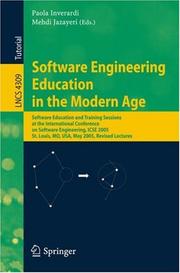
ISBN: 9783540682035 3540682031 354068204X Year: 2006 Publisher: Berlin ; New York : Springer,
Abstract | Keywords | Export | Availability | Bookmark
 Loading...
Loading...Choose an application
- Reference Manager
- EndNote
- RefWorks (Direct export to RefWorks)
Software Engineering is a multifaceted and expanding topic. It aims to provide theories, methods and tools to tackle the complexity of software systems, from development to maintenance. Its complexity is made even more severe today by rapidadvancesin technology,the pervasivenessofsoftwareinallareasofsociety, and the globalization of software development. The continuous expansion of the ?eld presents the problem of how to keep up for practitioners. For educators, the key questions are how should software engineers be educated and what are the core topics and key technologies? Even looking only at the last decade, the tremendous changes that have taken place in the software engineering industry, and in the industrial world in general,raise many questions. What are the e?ects of: Outsourcing?Distributed softwaredevelopment?Opensource?Standardization?Softwarepatents?Mod- driven development? How should these developments change the way we teach softwareengineering?Shouldtextbooksbeupdated?Shouldsoftwareengineering play a di?erent role in the computer science curriculum, for example, be more pervasive? How are instructors in universities handling these issues? All these issues were discussed at the Software Education and Training s- sions at the International Conference on Software Engineering (ICSE 2005) by leading researchers, educators, and practitioners in software engineering, who presented their—sometimes controversial—views and insights on software en- neering education in the new millennium. In this volume we have collected some of the most representative and innovative approachesthat were presented at the workshop. The authors revised their papers based on discussions at the conf- ence and the comments they received from the reviews.
Software engineering --- Computer Science --- Engineering & Applied Sciences --- Study and teaching (Higher) --- Computer software engineering --- Computer science. --- Software engineering. --- Education --- Computers and civilization. --- Computer Science. --- Software Engineering/Programming and Operating Systems. --- Computers and Education. --- Computers and Society. --- Data processing. --- Civilization and computers --- Civilization --- Computer uses in education --- Computers in education --- Educational computing --- Microcomputer uses in education --- Microcomputers in education --- Engineering --- Informatics --- Science --- Education. --- Children --- Education, Primitive --- Education of children --- Human resource development --- Instruction --- Pedagogy --- Schooling --- Students --- Youth --- Learning and scholarship --- Mental discipline --- Schools --- Teaching --- Training --- Education—Data processing.
Book
ISBN: 0471853992 9780471853992 Year: 1987 Publisher: New York: Wiley,
Abstract | Keywords | Export | Availability | Bookmark
 Loading...
Loading...Choose an application
- Reference Manager
- EndNote
- RefWorks (Direct export to RefWorks)
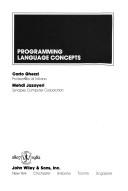
ISBN: 0471087556 047186482X 9780471864820 Year: 1982 Publisher: New York: Wiley,
Abstract | Keywords | Export | Availability | Bookmark
 Loading...
Loading...Choose an application
- Reference Manager
- EndNote
- RefWorks (Direct export to RefWorks)
Programming languages (Electronic computers) --- Langages de programmation --- Programming languages (Electronic computers). --- Programming --- 681.3*D30 --- Computer languages --- Computer program languages --- Computer programming languages --- Machine language --- Electronic data processing --- Languages, Artificial --- Computerwetenschap--?*D30
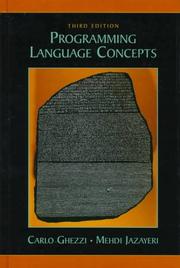
ISBN: 0471104264 Year: 1998 Publisher: New York John Wiley & Sons
Abstract | Keywords | Export | Availability | Bookmark
 Loading...
Loading...Choose an application
- Reference Manager
- EndNote
- RefWorks (Direct export to RefWorks)
Multi
ISBN: 9783540682042 Year: 2006 Publisher: Berlin Heidelberg Springer-Verlag GmbH
Abstract | Keywords | Export | Availability | Bookmark
 Loading...
Loading...Choose an application
- Reference Manager
- EndNote
- RefWorks (Direct export to RefWorks)
Software Engineering is a multifaceted and expanding topic. It aims to provide theories, methods and tools to tackle the complexity of software systems, from development to maintenance. Its complexity is made even more severe today by rapidadvancesin technology,the pervasivenessofsoftwareinallareasofsociety, and the globalization of software development. The continuous expansion of the ?eld presents the problem of how to keep up for practitioners. For educators, the key questions are how should software engineers be educated and what are the core topics and key technologies? Even looking only at the last decade, the tremendous changes that have taken place in the software engineering industry, and in the industrial world in general,raise many questions. What are the e?ects of: Outsourcing?Distributed softwaredevelopment?Opensource?Standardization?Softwarepatents?Mod- driven development? How should these developments change the way we teach softwareengineering?Shouldtextbooksbeupdated?Shouldsoftwareengineering play a di?erent role in the computer science curriculum, for example, be more pervasive? How are instructors in universities handling these issues? All these issues were discussed at the Software Education and Training s- sions at the International Conference on Software Engineering (ICSE 2005) by leading researchers, educators, and practitioners in software engineering, who presented their sometimes controversial views and insights on software en- neering education in the new millennium. In this volume we have collected some of the most representative and innovative approachesthat were presented at the workshop. The authors revised their papers based on discussions at the conf- ence and the comments they received from the reviews.
Computer assisted instruction --- Programming --- Computer. Automation --- informatica --- maatschappij --- computerbesturingssystemen --- computerondersteund onderwijs --- programmeren (informatica)
Book
Abstract | Keywords | Export | Availability | Bookmark
 Loading...
Loading...Choose an application
- Reference Manager
- EndNote
- RefWorks (Direct export to RefWorks)
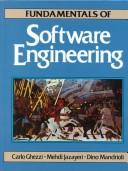
ISBN: 0138182043 9780138182045 Year: 1991 Publisher: Englewood Cliffs: Prentice Hall,
Abstract | Keywords | Export | Availability | Bookmark
 Loading...
Loading...Choose an application
- Reference Manager
- EndNote
- RefWorks (Direct export to RefWorks)
Programming --- Computer science --- 681.3*D2 --- Software engineering: protection mechanisms; standards--See also {681.3*K63}; {681.3*K51} --- 681.3*D2 Software engineering: protection mechanisms; standards--See also {681.3*K63}; {681.3*K51} --- Software engineering --- process modelling --- software verificate --- Specification

ISBN: 0138204322 9780138204327 Year: 1991 Publisher: Englewood Cliffs, N.J.: Prentice Hall,
Abstract | Keywords | Export | Availability | Bookmark
 Loading...
Loading...Choose an application
- Reference Manager
- EndNote
- RefWorks (Direct export to RefWorks)
Software engineering --- Software-technologie --- Technologie du software --- Génie logiciel --- Software Engineering
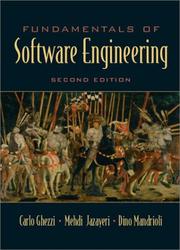
ISBN: 0133056996 Year: 2003 Publisher: Englewood Cliffs, N.J. Prentice Hall
Abstract | Keywords | Export | Availability | Bookmark
 Loading...
Loading...Choose an application
- Reference Manager
- EndNote
- RefWorks (Direct export to RefWorks)
Computer science --- Programming --- Software engineering --- 681.3*D2 --- Computer software engineering --- Engineering --- 681.3*D2 Software engineering: protection mechanisms; standards--See also {681.3*K63}; {681.3*K51} --- Software engineering: protection mechanisms; standards--See also {681.3*K63}; {681.3*K51}
Book
ISBN: 9783540682042 Year: 2006 Publisher: Berlin Heidelberg Springer Berlin Heidelberg
Abstract | Keywords | Export | Availability | Bookmark
 Loading...
Loading...Choose an application
- Reference Manager
- EndNote
- RefWorks (Direct export to RefWorks)
Software Engineering is a multifaceted and expanding topic. It aims to provide theories, methods and tools to tackle the complexity of software systems, from development to maintenance. Its complexity is made even more severe today by rapidadvancesin technology,the pervasivenessofsoftwareinallareasofsociety, and the globalization of software development. The continuous expansion of the ?eld presents the problem of how to keep up for practitioners. For educators, the key questions are how should software engineers be educated and what are the core topics and key technologies? Even looking only at the last decade, the tremendous changes that have taken place in the software engineering industry, and in the industrial world in general,raise many questions. What are the e?ects of: Outsourcing?Distributed softwaredevelopment?Opensource?Standardization?Softwarepatents?Mod- driven development? How should these developments change the way we teach softwareengineering?Shouldtextbooksbeupdated?Shouldsoftwareengineering play a di?erent role in the computer science curriculum, for example, be more pervasive? How are instructors in universities handling these issues? All these issues were discussed at the Software Education and Training s- sions at the International Conference on Software Engineering (ICSE 2005) by leading researchers, educators, and practitioners in software engineering, who presented their sometimes controversial views and insights on software en- neering education in the new millennium. In this volume we have collected some of the most representative and innovative approachesthat were presented at the workshop. The authors revised their papers based on discussions at the conf- ence and the comments they received from the reviews.
Computer assisted instruction --- Programming --- Computer. Automation --- informatica --- maatschappij --- computerbesturingssystemen --- computerondersteund onderwijs --- programmeren (informatica)
| Listing 1 - 10 of 20 | << page >> |
Sort by
|

 Search
Search Feedback
Feedback About UniCat
About UniCat  Help
Help News
News